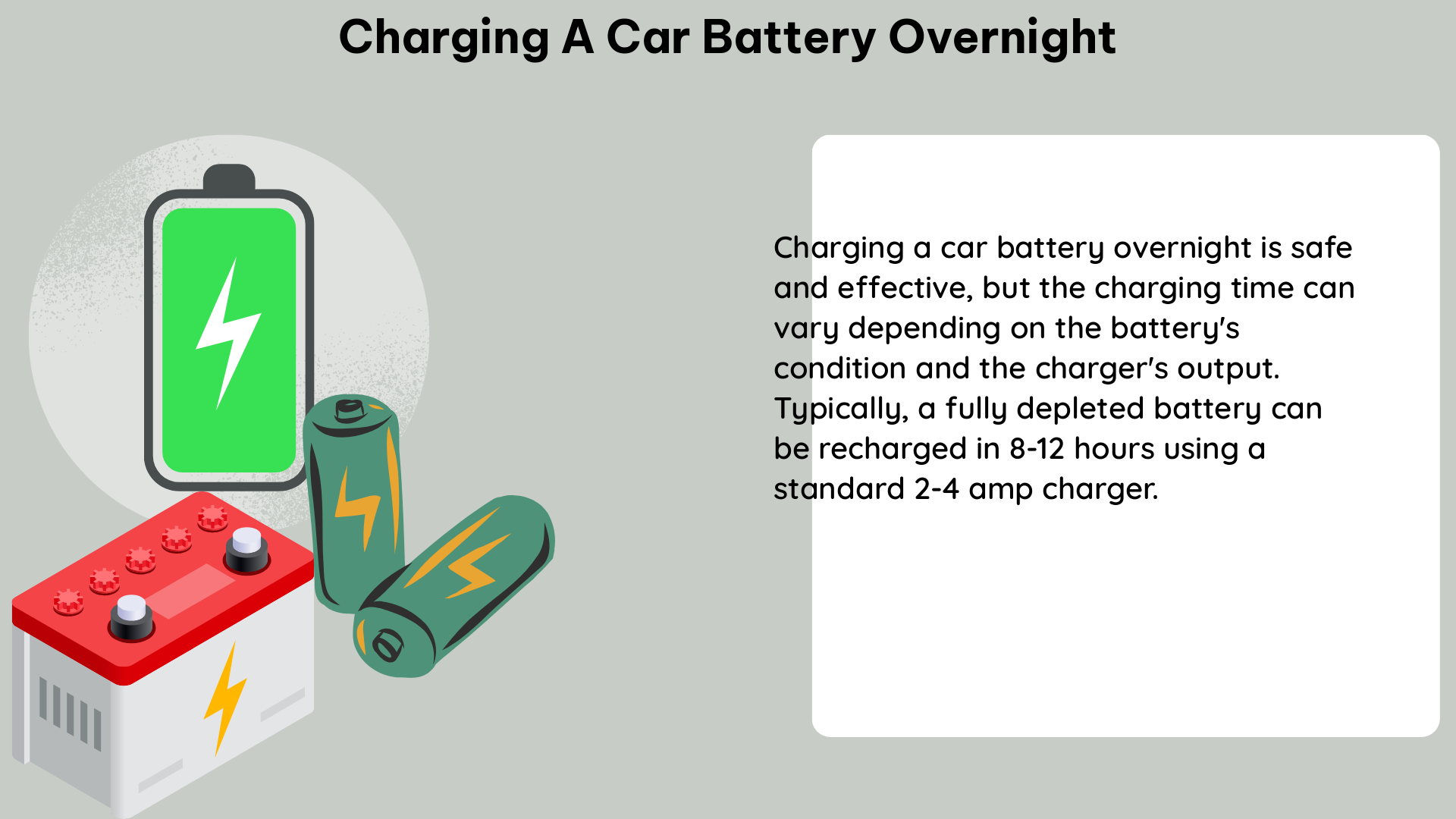Charging a car battery overnight is a common practice, but it’s crucial to understand the technical specifications and best practices to ensure the battery’s longevity and optimal performance. This comprehensive guide will delve into the intricacies of overnight car battery charging, providing you with the knowledge and tools to charge your battery safely and effectively.
Recommended Charging Level for Daily Use
Firstly, it’s recommended to charge most electric vehicle (EV) batteries to 80% for daily use. Charging to 100% can unnecessarily stress the battery and reduce its lifespan. This is due to the fact that lithium-ion batteries, commonly used in EVs, degrade faster when they are consistently charged to 100%. Charging to 80% provides a balance between battery health and range, as most daily commutes do not require a full charge.
According to a study by the National Renewable Energy Laboratory (NREL), charging an EV battery to 80% instead of 100% can extend its lifespan by up to 10%. This is because the higher state of charge (SOC) levels, such as 100%, put more strain on the battery’s internal components, leading to accelerated degradation.
Monitoring the Charging Process

When charging an EV battery overnight, it’s crucial to monitor the charging process and ensure that the battery is not overcharged. This can be done by using a battery management system (BMS) that controls the charging process and prevents overcharging. Additionally, some EVs have a feature that limits the charging rate to protect the battery.
The BMS is responsible for several critical functions, including:
– Monitoring the battery’s voltage, current, and temperature
– Balancing the individual cells within the battery pack
– Preventing overcharging and overdischarging
– Optimizing the charging process for maximum efficiency and battery life
By utilizing the BMS, you can ensure that your car battery is charged safely and efficiently, without the risk of overcharging or damaging the battery.
Factors Affecting Charging Time
The charging time for a car battery depends on several factors, including the battery’s capacity and the charging rate. For example, a 40 Ah (Ampere-hour) battery can take between 4.5 and 8 hours to charge with a 10 amp charger if it’s completely discharged.
However, it’s important to note that deep discharging a lead-acid battery can damage it, so it’s best to avoid letting the battery fully discharge. The table below provides a general guideline for charging times based on battery capacity and charging rate:
| Battery Capacity (Ah) | Charging Rate (Amps) | Charging Time (Hours) |
|---|---|---|
| 20 | 5 | 4-6 |
| 40 | 10 | 4.5-8 |
| 60 | 15 | 4-6.5 |
| 80 | 20 | 4-6 |
It’s important to note that these are approximate values, and the actual charging time may vary depending on the battery’s condition, the charger’s efficiency, and other factors.
Choosing the Right Charger
When charging a car battery overnight, it’s recommended to use a charger that is designed for car batteries and has an automatic shut-off feature to prevent overcharging. Additionally, it’s important to ensure that the charger is rated for the battery’s voltage and amperage.
Here are some key considerations when selecting a car battery charger:
- Voltage Rating: Ensure that the charger’s voltage rating matches the battery’s voltage. Common car battery voltages are 12V and 6V.
- Amperage Rating: The charger’s amperage rating should be appropriate for the battery’s capacity. A higher amperage rating will charge the battery faster, but it’s important not to exceed the battery’s recommended charging rate.
- Automatic Shut-Off: Look for a charger with an automatic shut-off feature that will stop charging once the battery is fully charged or if it detects any issues.
- Compatibility: Ensure that the charger is compatible with the type of battery in your car, whether it’s a lead-acid, lithium-ion, or other type of battery.
- Safety Features: Consider a charger with additional safety features, such as reverse polarity protection, short-circuit protection, and spark-proof connections.
By choosing the right charger and following the recommended charging practices, you can ensure that your car battery is charged safely and efficiently, prolonging its lifespan and maintaining optimal performance.
Conclusion
Charging a car battery overnight requires careful consideration of the battery’s technical specifications and best practices to ensure its longevity. Charging to 80% for daily use, monitoring the charging process, and using a charger that is designed for car batteries are all important factors to keep in mind. By following the guidelines and recommendations outlined in this comprehensive guide, you can confidently charge your car battery overnight and maintain the health and performance of your vehicle’s power source.
References:
– The Driven, Debunking the 80/20 limits on EV battery charging – The Driven, https://thedriven.io/2023/04/04/debunking-the-80-20-limits-on-ev-battery-charging-more-fud-from-fossil-fuel-industry/
– SpeakEV, How often should an EV battery be charged to 100%, https://www.speakev.com/threads/how-often-should-an-ev-battery-be-charged-to-100.153461/
– Mechanics Stack Exchange, Acceptable battery voltage drop overnight, https://mechanics.stackexchange.com/questions/67864/acceptable-battery-voltage-drop-overnight
– AnandTech Forums, How long does it take to charge a battery?, https://forums.anandtech.com/threads/how-long-does-it-take-to-charge-a-battery.2125386/
– Reddit, So this car battery is been charging for 15 hours and still the …, https://www.reddit.com/r/batteries/comments/12jls66/so_this_car_battery_is_been_charging_for_15_hours/
– National Renewable Energy Laboratory (NREL), “Battery Degradation and Performance Models for Electric Vehicles”, https://www.nrel.gov/analysis/battery-degradation.html

The lambdageeks.com Core SME Team is a group of experienced subject matter experts from diverse scientific and technical fields including Physics, Chemistry, Technology,Electronics & Electrical Engineering, Automotive, Mechanical Engineering. Our team collaborates to create high-quality, well-researched articles on a wide range of science and technology topics for the lambdageeks.com website.
All Our Senior SME are having more than 7 Years of experience in the respective fields . They are either Working Industry Professionals or assocaited With different Universities. Refer Our Authors Page to get to know About our Core SMEs.